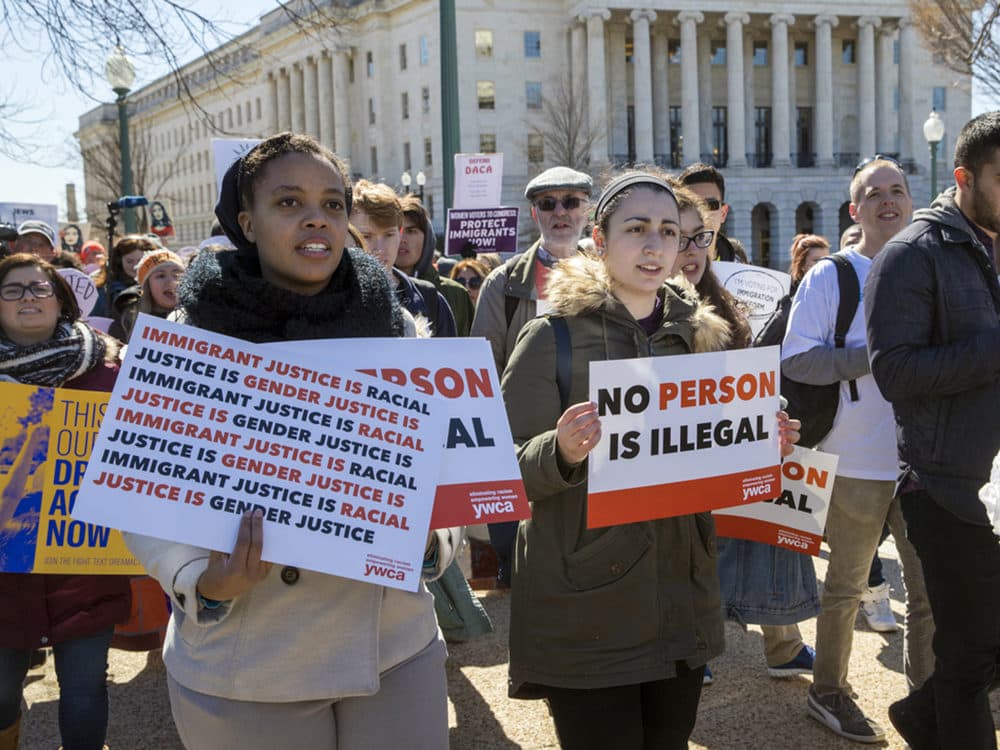Advertisement
Immigration Stories To Watch In 2020
The pace of change in immigration policy over the last three years can feel staggering, even for those of us tasked with reporting and understanding those changes.
So, we've compiled a short list of some of the most pressing topics we'll be watching in 2020, both nationally and in Massachusetts.
Safe Communities Act & Driver's Licenses
![Proponents of driver's licenses for undocumented immigrants rallied in front of the State House on Wednesday morning ahead of a hearing on the proposal. [Photo: Colin A. Young/SHNS]](https://media.wbur.org/wp/2019/09/09-04_Undocumented_licenses_CAY-1000x697.jpg)
The legislation would limit interaction between local police and U.S. Immigration and Customs Enforcement (ICE). Among other things, it ends what are known as 287g partnerships in the state, which deputize local law enforcement agents to perform some duties of a federal immigration official. It would also prohibit law enforcement and court personnel from asking a person about their immigration status.
The bill is sure to be hotly contested among state representatives and senators. Even if the Safe Communities Act were to reach Governor Charlie Baker's desk, he's said he'd likely veto the measure. Baker has repeatedly said he believes state officials need to collaborate with ICE in cases of violent criminals. Because of that, he does not support a so-called sanctuary state policy. Instead, he believes communities should decide their own policies at the local level.
Baker also opposes a bill before the joint committee on transportation that would allow undocumented immigrants to secure driver's licenses, a measure that immigrant advocates say would make all Massachusetts residents safer.
Status For Haiti, Honduras And El Salvador

There are an estimated 12,000 Temporary Protected Status holders living and working in Massachusetts. Citizens of El Salvador and Haiti make up two of the largest communities of TPS recipients in the state, followed by nearly 1,000 protected Hondurans.
The humanitarian immigration status allows people whose home countries have been hit hard by natural disasters or civil unrest to temporarily live and work in the U.S. without fear of deportation. Beginning in 2017, the Trump administration announced the termination of TPS for several nations, citing improved country conditions and the temporary nature of the status. Immigration advocates, in turn, have filed lawsuits across the country, including in Boston federal court, challenging the constitutionality of the termination.
Earlier this year, a federal judge in California temporarily blocked the Trump administration from ending TPS until he rules on the merits of a case. After appealing that decision, the U.S. Department of Homeland Security automatically extended protections for TPS holders from El Salvador, Haiti and Honduras through Jan. 4, 2021. A decision out of California is expected in the coming year — a ruling that hundreds of thousands of TPS recipients across the country, and the nearly 12,000 TPS holders throughout Massachusetts, will be watching closely.
Advertisement
DACA At The Supreme Court

In September 2017, the Trump administration announced the end of the Obama-era program known as Deferred Action for Childhood Arrivals (DACA). Then-Attorney General Jeff Sessions made the argument that President Obama overreached his executive authority when he enacted the program in 2012. Under DACA, eligible young people whose parents brought them to the U.S. without authorization are afforded temporary and limited protections from deportation. Since the program was started, 800,000 recipients nationwide have been able to study and work in the U.S. under this temporary status — including about 8,000 in Massachusetts and close to 15,000 throughout New England.
A number of legal challenges have since played out in courtrooms across the country, with federal appeals judges ruling that ending a program like DACA, which has far-reaching implications for communities and businesses throughout the U.S., requires a coherent explanation and cost benefit analysis from the Trump administration.
The battle over DACA's future made it all the way to the Supreme Court of the United States in November. We should see a decision from the court sometime in the spring.
Election 2020
Voters in Greater Boston and across the country are watching closely as the debate over immigration is discussed on the campaign trail. Ultimately, the race for the White House will determine the fate of the Trump administration's restrictionist trajectory and with it, the fate of immigrants across the country.
